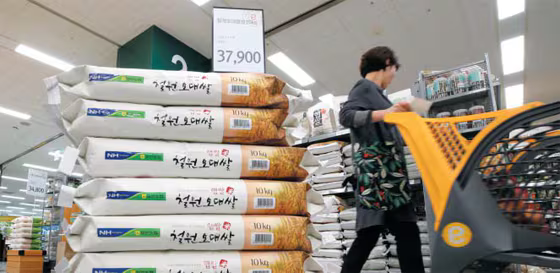Tags
Korea maintains no market opening stance on sensitive rice and beef imports
Korea’s agriculture officials remain firm against the import of sensitive food products amid trade pressures.
By Kim Min-jeong

The possibility of excluding “sensitive items” such as rice and beef from the negotiation cards in the Korea-U.S. trade negotiations is increasing. The Ministry of Agriculture, Food and Rural Affairs maintains a “no market opening” stance on the two items, which directly affect the nation’s food supply and agriculture, but the trade authorities do not rule out the possibility of using them as a last-minute card depending on the negotiation situation. In particular, following the conclusion of U.S.-Japan tariff negotiations on the 22nd (local time), in which Japan agreed to expand the share of U.S. rice within its rice quota, there are increasing observations that U.S. pressure for rice market opening toward Korea may intensify.
According to relevant departments on the 23rd, key ministers from trade-related departments, including Deputy Prime Minister and Minister of Economy and Finance Koo Yun-cheol, will visit the United States consecutively to engage in high-level trade consultations. Observers suggest that this will be effectively the final negotiation held a week before the expiration of the U.S. reciprocal tariff waiver.
The government reportedly organized its basic stance on agricultural product issues, along with countermeasures for the industry, digital, and eco-friendly sectors, at the external economic relations ministers’ meeting chaired by Deputy Prime Minister Koo the previous day.
It is known that the agricultural products included in the negotiation card that the government initially reviewed internally included sensitive items such as U.S. beef over 30 months old and rice. The Ministry of Agriculture, Food and Rural Affairs is currently defending against discussions on sensitive items such as rice and beef being brought to the negotiation table.
It aims to exclude these matters from the review of opening, as they directly impact farmers and are connected to food sovereignty. During the external economic ministers’ meeting, there were also discussions about designating the two items as a “red line” considering their economic impact on farmers and trade repercussions.
In the case of beef, after allowing imports of U.S. beef under 30 months through the Free Trade Agreement (FTA) negotiations in 2008, Korea became the largest importer of U.S. beef. Nevertheless, the U.S. has consistently raised issues regarding the import restrictions on beef over 30 months. However, the current Livestock Infectious Diseases Control Act prohibits imports of beef from countries where BSE occurred within five years, making negotiations difficult without legal amendments. There was a BSE outbreak in a slaughterhouse in South Carolina on May 22, 2023.
The situation is similar for rice. According to the WTO rice negotiations, Korea allocates 408,700 tons of tariff-free import quota (TRQ) annually to five countries: the U.S., China, Australia, Thailand, and Vietnam. Among this, U.S. rice accounts for about 132,000 tons, or about 32% of the total. There are concerns that increasing only the proportion of U.S. rice while maintaining the TRQ itself could raise issues of equity and violations of WTO agreements.
However, the results of the U.S.-Japan tariff negotiations have made the situation somewhat complicated. According to NHK reports, the Japanese government reached an agreement with the U.S. to effectively expand the share of U.S. rice while maintaining the annual minimum access total of 770,000 tons. Japan is already importing over 340,000 tons of rice from the U.S. as of 2023, and this agreement will reduce the share of other exporting countries such as Thailand and Australia.
Within the Korean government, there are discussions about using a Japanese-style negotiation model, which maintains the total amount while increasing the U.S. rice quota share as a negotiation card. Regarding this, a government official noted, “In theory, adjusting the share is possible, but the political burden is significant,” adding, “Since rice and beef are sensitive issues directly related to public sentiment, it is a principle not to use them as negotiation cards.”
The government is reportedly considering adjusting the negotiation leverage to focus on relatively less sensitive items, such as corn for fuel, instead of rice and beef, which have significant negotiation impact. In particular, corn, which is used as a raw material for bioethanol, already has a distribution network established domestically and is classified as an item with potential for further opening. Other items, such as apples and genetically modified (LMO) potatoes, demanded by the U.S., are also classified as items that can be imported separately from trade negotiations through scientific evaluations and procedures.
The government plans to approach this by considering the intensity of U.S. demands and the negotiation leeway in other industrial sectors. Meeting with reporters on the day of his departure, Minister of Trade, Industry and Energy Kim Jeong-kwan stated, “Since the results of the tariff negotiations could have significant ripple effects on our economy, the government will thoroughly respond by closely considering the sensitivity of our entire industry.”
https://biz.chosun.com/en/en-policy/2025/07/23/IBEBEDL77ZDC7HOIPQJMI44BKI/Published Date: July 23, 2025






